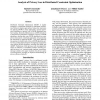Free Online Productivity Tools
i2Speak
i2Symbol
i2OCR
iTex2Img
iWeb2Print
iWeb2Shot
i2Type
iPdf2Split
iPdf2Merge
i2Bopomofo
i2Arabic
i2Style
i2Image
i2PDF
iLatex2Rtf
Sci2ools
AAAI
2006
2006
Analysis of Privacy Loss in Distributed Constraint Optimization
Distributed Constraint Optimization (DCOP) is rapidly emerging as a prominent technique for multiagent coordination. However, despite agent privacy being a key motivation for applying DCOPs in many applications, rigorous quantitative evaluations of privacy loss in DCOP algorithms have been lacking. Recently, [Maheswaran et al.2005] introduced a framework for quantitative evaluations of privacy in DCOP algorithms, showing that some DCOP algorithms lose more privacy than purely centralized approaches and questioning the motivation for applying DCOPs. This paper addresses the question of whether state-of-the art DCOP algorithms suffer from a similar shortcoming by investigating several of the most efficient DCOP algorithms, including both DPOP and ADOPT. Furthermore, while previous work investigated the impact on efficiency of distributed contraint reasoning design decisions (e.g. constraint-graph topology, asynchrony, message-contents), this paper examines the privacy aspect of such dec...
Related Content
| Added | 30 Oct 2010 |
| Updated | 30 Oct 2010 |
| Type | Conference |
| Year | 2006 |
| Where | AAAI |
| Authors | Rachel Greenstadt, Jonathan P. Pearce, Milind Tambe |
Comments (0)

